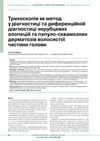 January 2010 in “Nihon Hou Kagaku Gijutsu Gakkaishi”
January 2010 in “Nihon Hou Kagaku Gijutsu Gakkaishi” The modified staining method can determine the ABO blood group of hair samples accurately.
 December 2019 in “Дерматологія та венерологія”
December 2019 in “Дерматологія та венерологія” Trichoscopy is a useful tool for diagnosing hair and scalp disorders.
[object Object]  3 citations,
May 2011 in “Medical Hypotheses”
3 citations,
May 2011 in “Medical Hypotheses” Transnasal cooling could reveal new insights into various physiological conditions and may be a natural way to transfer heat from the brain.
 April 2005 in “Dermatologic Clinics”
April 2005 in “Dermatologic Clinics” The document summarizes recent dermatological treatments and advances in areas like pediatric care, wound healing, skin closure, light-based therapies, pigment disorders, hair loss, immunotherapy, infection management, melanoma, drug reactions, and facial rejuvenation.

COVID-19 may trigger or worsen rapid hair loss in alopecia areata.
 1 citations,
June 2014 in “Serbian Journal of Dermatology and Venereology”
1 citations,
June 2014 in “Serbian Journal of Dermatology and Venereology” A woman with discoid lupus improved with treatment after being misdiagnosed with a different hair loss condition.
 21 citations,
January 2024 in “Science Immunology”
21 citations,
January 2024 in “Science Immunology” Regulatory T cells protect hair follicle stem cells by maintaining immune privilege in the skin.
 February 2014 in “Medicine - Programa De Formación Médica Continuada Acreditado”
February 2014 in “Medicine - Programa De Formación Médica Continuada Acreditado” The document concludes that non-scarring alopecias can be reversed, but scarring alopecias cause permanent hair loss.
 1 citations,
April 2019 in “Aesthetic Plastic Surgery”
1 citations,
April 2019 in “Aesthetic Plastic Surgery” Secondary hairline correction surgery can be effective and satisfying when customized to the patient's needs.
 3 citations,
March 2019 in “Archives of Plastic Surgery”
3 citations,
March 2019 in “Archives of Plastic Surgery” Hair transplantation effectively corrects hairline issues after midface-lifting surgery with high patient and physician satisfaction.
5 citations,
September 2021 in “Clinical case reports” GLPLS is a rare skin condition with specific hair loss and skin symptoms.
 4 citations,
November 2020 in “Journal of Cosmetic Dermatology”
4 citations,
November 2020 in “Journal of Cosmetic Dermatology” Most Facebook posts about hair loss treatments are promotional and not medically supported, with better quality information found on YouTube.
 October 2023 in “Pathology”
October 2023 in “Pathology” A woman had a rare reaction to ear piercing that caused earlobe swelling, which was best treated by removing the piercing and not re-piercing.
 10 citations,
May 2012 in “PloS one”
10 citations,
May 2012 in “PloS one” Low ERCC3 gene activity is linked to non-pigmented hair growth.
 48 citations,
April 2019 in “ACS Applied Materials & Interfaces”
48 citations,
April 2019 in “ACS Applied Materials & Interfaces” A new method for delivering drugs through the skin using biodegradable particles was found to be effective.

A new mutation in the CYP11B1 gene was found in a woman with mild hyperandrogenemia, a rare cause of non-classic congenital adrenal hyperplasia.
 June 2013 in “Vestnik dermatologii i venerologii”
June 2013 in “Vestnik dermatologii i venerologii” Women with hair thinning have disrupted steroid hormone levels, but this doesn't often show as other health issues. More research is needed on hormone balance in this condition.
[object Object]  2 citations,
December 2021 in “Dermatology Online Journal”
2 citations,
December 2021 in “Dermatology Online Journal” COVID-19 has increased hair loss, but many patients see regrowth within months.
 7 citations,
January 2016 in “Experimental and Clinical Endocrinology & Diabetes”
7 citations,
January 2016 in “Experimental and Clinical Endocrinology & Diabetes” Simvastatin may help manage symptoms in women with non-classic congenital adrenal hyperplasia by lowering cholesterol and certain hormone levels.
 6 citations,
January 2016 in “International Journal of Andrology”
6 citations,
January 2016 in “International Journal of Andrology” Bald men may have a lower risk of testicular cancer.
 42 citations,
April 2013 in “Steroids”
42 citations,
April 2013 in “Steroids” Non-classic congenital adrenal hyperplasia is a common disorder causing symptoms like acne and infertility, and it's managed based on symptoms, not just test results. Treatment can improve fertility and reduce miscarriage risk.
 18 citations,
May 2013 in “Journal of Dermatological Treatment”
18 citations,
May 2013 in “Journal of Dermatological Treatment” Non-ablative fractional laser treatments have a low risk of side effects in Asian patients.
 1 citations,
November 2019 in “International Journal of Women's Dermatology”
1 citations,
November 2019 in “International Journal of Women's Dermatology” Ketoconazole shampoo can cause rare pink hair discoloration.
 3 citations,
September 2016 in “Hair transplant forum international”
3 citations,
September 2016 in “Hair transplant forum international” Southeast and East Asian men typically have straighter hairlines with less recession and lower hair density, which is important to consider in hair restoration surgery.
 4 citations,
May 2015 in “Indian Journal of Dermatology, Venereology and Leprology”
4 citations,
May 2015 in “Indian Journal of Dermatology, Venereology and Leprology” Congenital triangular alopecia can occur outside the typical fronto-temporal region.
 15 citations,
September 2016 in “Hair transplant forum international”
15 citations,
September 2016 in “Hair transplant forum international” The "open punch" technique for hair transplantation can help reduce damage to hair grafts and may be especially useful for beginners and in cases with curly hair.
Vitamin supplements may not improve hair thickness or density in patients with non-scarring hair loss.
1 citations,
July 2021 in “Current nanomedicine” The new gel formulation for Acitretin improves topical delivery and reduces oral toxicity.
 260 citations,
January 2019 in “Pharmaceutics”
260 citations,
January 2019 in “Pharmaceutics” Niosomes are a promising, stable, and cost-effective drug delivery system with potential for improved targeting and safety.
 13 citations,
June 2021 in “Carcinogenesis”
13 citations,
June 2021 in “Carcinogenesis” Certain hair straighteners and dyes may increase ovarian cancer risk, especially in African American/Black women.



























